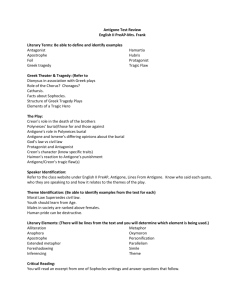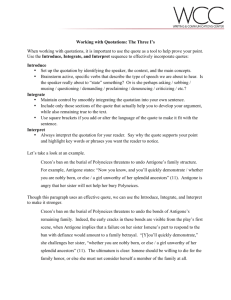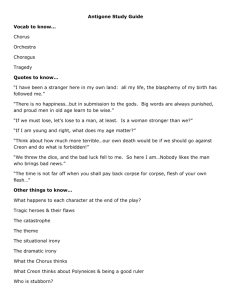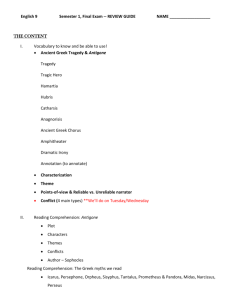Antigone Exam Review PART I (30 minutes) The following are
advertisement
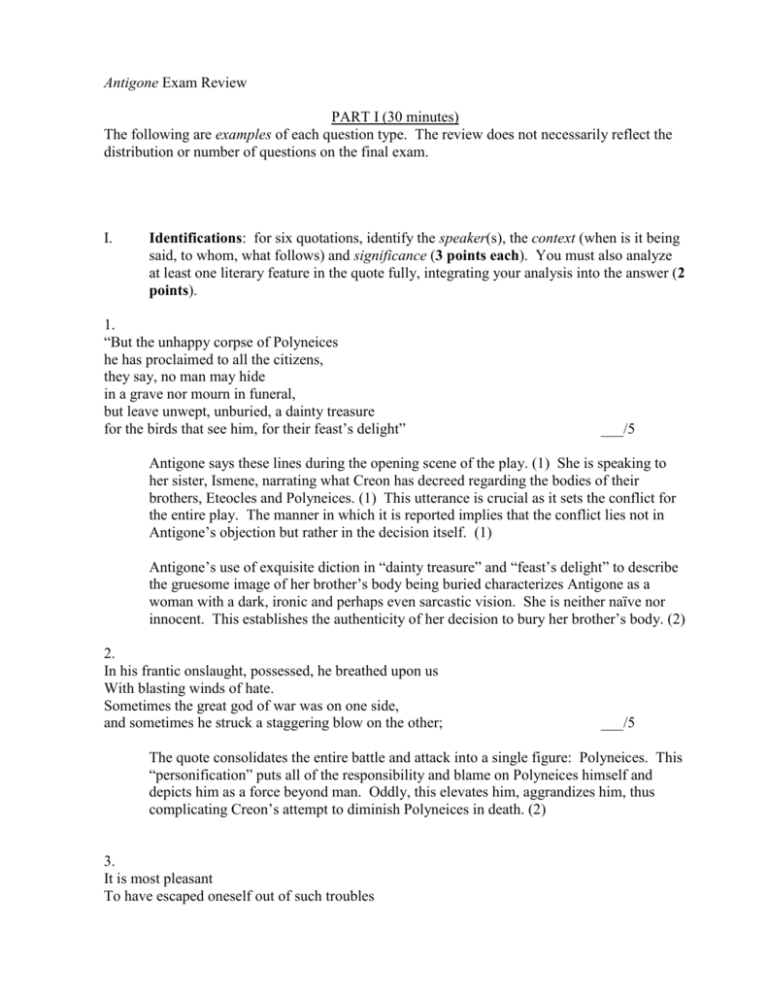
Antigone Exam Review PART I (30 minutes) The following are examples of each question type. The review does not necessarily reflect the distribution or number of questions on the final exam. I. Identifications: for six quotations, identify the speaker(s), the context (when is it being said, to whom, what follows) and significance (3 points each). You must also analyze at least one literary feature in the quote fully, integrating your analysis into the answer (2 points). 1. “But the unhappy corpse of Polyneices he has proclaimed to all the citizens, they say, no man may hide in a grave nor mourn in funeral, but leave unwept, unburied, a dainty treasure for the birds that see him, for their feast’s delight” ___/5 Antigone says these lines during the opening scene of the play. (1) She is speaking to her sister, Ismene, narrating what Creon has decreed regarding the bodies of their brothers, Eteocles and Polyneices. (1) This utterance is crucial as it sets the conflict for the entire play. The manner in which it is reported implies that the conflict lies not in Antigone’s objection but rather in the decision itself. (1) Antigone’s use of exquisite diction in “dainty treasure” and “feast’s delight” to describe the gruesome image of her brother’s body being buried characterizes Antigone as a woman with a dark, ironic and perhaps even sarcastic vision. She is neither naïve nor innocent. This establishes the authenticity of her decision to bury her brother’s body. (2) 2. In his frantic onslaught, possessed, he breathed upon us With blasting winds of hate. Sometimes the great god of war was on one side, and sometimes he struck a staggering blow on the other; ___/5 The quote consolidates the entire battle and attack into a single figure: Polyneices. This “personification” puts all of the responsibility and blame on Polyneices himself and depicts him as a force beyond man. Oddly, this elevates him, aggrandizes him, thus complicating Creon’s attempt to diminish Polyneices in death. (2) 3. It is most pleasant To have escaped oneself out of such troubles But painful to bring into it those whom we love. However, it is but natural for me To count all this less than my own escape. ___/5 This quote is said by the Sentry to Creon (1) when he is delivering Antigone to Creon after having been threatened with execution if he does not find out who performed burial rites on Polyneices body. (1) The significance of this quotation is that it lends support to Haemon and Antigone’s hints that the rest of Thebes silently disagrees with Creon’s edict and the nature of his rule. (1) The sentence structure in these lines sets it apart from the rest of the play. The additive clauses and shifts created by “but” and “however” characterize the Sentry as loose in his thoughts and perhaps a bit unsure. This contrasts with the utter certainty with which both Creon and Antigone speak. (2) Identifications will most certainly focus on key moments in the play. That said, do not ignore the Chorus as a potential source of identifications. II. Readings on Ancient Greek History (3 points each) 1. In ancient Greece, how did the relationship between gods and men change over time?____/3 Over time, the distance between gods and men grew greater and greater. Whereas early on, gods and men dined together, the first sacrifice and every sacrifice after that drew them further apart. 2. List, in your own words, at least three of the five functions of religion in Greek culture. ____/3 Steer ancient Greeks through the major rites of passage that mark their lives (birth, puberty, marriage, etc.) Provides a means of organizing groups in order to emphasize sense of community Discourages individualism A source of prophetic advice Healing Topics covered: gods vs. men, relationship between gods and men, heroes vs. gods, seers, relationship between Greek religion and morality, festivals, purpose of cult, Athens vs. Sparta, tribes in Ancient Greece, phratry, the family in Ancient Greece, Ancient Greek conception of freedom, citizenship, women in Ancient Greece III. Ancient Greek Drama: define the following terms and provide a concrete example from Antigone. 1. Hamartia ____/3 In Greek tragedy, hamartia refers to a tragic flaw or misperception that has catastrophic or tragic results for the protagonist. It is key that this blindness to a key insight is actually related to the protagonist’s strengths. (1) In Antigone, one could argue that Antigone’s hamartia is her hard-headedness. It doesn’t allow her to see the wisdom of taking a more diplomatic approach to the burial of Polyneices body; at the same time, her hard-headedness is also what contributes to her admirable strength of will and purpose. (2) 2. Catharsis ____/3 Catharsis is a purging of emotion that Greek tragedy aimed to bring about in its audience. The result is supposed to be a “moral or spiritual renewal” that serves as the end of any tragic work. (1) It could be argued that Creon hearing about the suicides of his son and wife from the messenger is the moment of catharsis in the play because it resolves the audience’s anger and frustration towards Creon’s blindness and, in some sense, delivers Antigone posthumous justice. (2) Terms covered: tragedy, catharsis, catastrophe, hamartia, hubris, anagnorisis, peripeteia IV. Excerpts from Justice, Michael Sandel: define the following terms and provide a concrete example from Antigone. 1. narrative conception of the self ____/3 Developed by Alisdair MacIntyre, it argues that we exist, without our consent, embedded in and encumbered by narratives or stories. As a result, we “inherit from the past of these things (family, tribe, nation, etc.) “debts, inheritances, rightful expectations, and obligations.” These cannot be ignored when we make decisions about how to define what is just. 2. moral individualism ____/3 We are responsible only for those obligations we consciously consent to. In addition, we are only what we choose to be. We have no political obligations to our community or country. Concepts covered: reparations, moral individualism, Lock, Kant, Rawls, veil of ignorance, morally neutral government, rights vs. ends, Aristotle, narrative conception of the self, communitarians, voluntary obligations, natural duties, obligations of solidarity/nonconsensual obligations, the good life, encumbered self PART II (40 minutes, open text and open note) I. Short response question Here, you will be asked to respond to a question about “Antigone.” Your response should be approximately 250-300 words and should cite well-chosen evidence from the play. A clear, explicit answer to the question in the form of a thesis statement is strongly recommended. This question will have only to do with the play and your response should limit itself to discussion and analysis of the play only. Example: Creon says to his son Haemon that it would be bad enough to yield to a man, but he would never yield to a woman (meaning Antigone). What does the play say about a woman's place in society? Be sure to cite specific quotes from the play to support your answers. II. Written task Here, you will be given a non-fiction piece that explicitly deals with the issues both “Antigone” and Sandel’s work address. You will be asked to synthesize these texts in the form of a written response. It should be approximately 250-300 words and should cite well-chosen evidence from the play as well as explicitly engage with at least one of the concepts addressed in Sandel’s piece.
